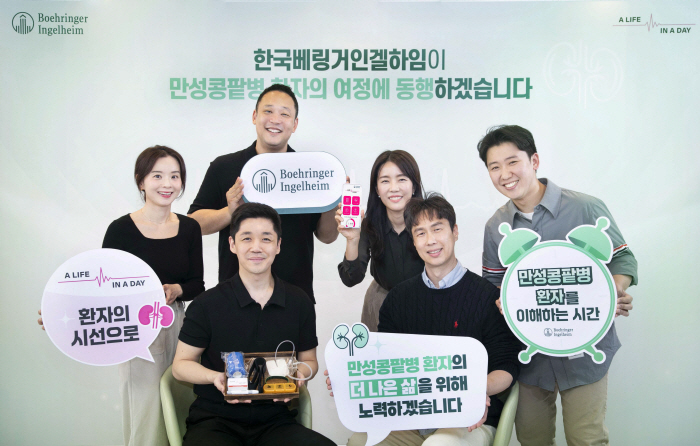The number of patients with chronic kidney disease due to aging ↑…Beringer Ingelheim Korea conducts a patient immersive experience program for executives and employees
Apr 15, 2025
The number of patients with chronic kidney disease is increasing with aging.
According to the Health Insurance Review and Assessment Service, the number of patients with chronic kidney disease surged from 157,583 in 2014 to 326,736 in 2023.
Chronic kidney disease is a disease in which the deterioration or damage of kidney function lasts for more than three months, and it is difficult to recognize because there are no obvious symptoms in the beginning. However, as the disease progresses, various symptoms such as swelling, anemia, and fatigue deteriorate the patient's quality of life. In particular, renal replacement therapy such as kidney transplantation or dialysis should be considered if it worsens to end-stage kidney disease due to not receiving adequate treatment early. Due to this burden of treatment and physical and mental difficulties, the quality of life of chronic kidney disease patients is only a quarter of that of normal people, and the quality of life of dialysis patients is reported to fall by half (54%).
Beringer Ingelheim Korea conducted a program for executives and employees to experience the daily difficulties of chronic kidney disease patients. This is a global program held by Boehringer Ingelheim at the same time at branches around the world every year, and this year, it is organized on the theme of chronic kidney disease patients. In Korea, eight executives and employees participated and experienced the life of a patient with chronic kidney disease for one day on the 11th.
This activity, organized in collaboration with the patient's immersive experience program 'Patient's Life in a Day', is designed to go beyond the delivery of disease information to experience the physical, emotional, and social difficulties that chronic kidney disease patients experience in daily life. Through this, it was intended to provide an opportunity to feel the pain of the patient, understand the daily life in depth, and consider treatment and communication methods from a real patient's point of view.
Employees who participated in the experience received real-time notifications of various situations that patients may experience through mobile applications and simulation kits, and did this for 24 hours. ▲ Mission tasks such as medication alarm, ▲ restriction of intake of sodium, etc., maintenance of low protein diet, ▲ simulation of symptoms such as fatigue and nausea, ▲ repetitive water limitation, ▲ dialysis, and virtual emergency experience were given in real time, and they were performed during work or daily life. In addition, while listening to a voice message containing the voice of a patient with chronic kidney disease, he indirectly experienced the social isolation and psychological burden experienced by the patient. After one day of experience, executives and employees had time to look back on their experiences and share their feelings.
Park Ji-young, executive director of CRM division in Beringer Ingelheim, Korea, said "Chronic kidney disease is a heavy burden on patients due to not only symptoms but also changes in life due to the disease."This experience would have served as an opportunity for executives and employees to understand the difficulties of chronic kidney disease patients and to approach the patient's journey in depth." Then "Beringer Ingelheim Korea will continue to strive to find ways to substantially contribute to the lives of patients with chronic kidney disease based on patient-centeredness."," he said.
According to the Health Insurance Review and Assessment Service, the number of patients with chronic kidney disease surged from 157,583 in 2014 to 326,736 in 2023.
Chronic kidney disease is a disease in which the deterioration or damage of kidney function lasts for more than three months, and it is difficult to recognize because there are no obvious symptoms in the beginning. However, as the disease progresses, various symptoms such as swelling, anemia, and fatigue deteriorate the patient's quality of life. In particular, renal replacement therapy such as kidney transplantation or dialysis should be considered if it worsens to end-stage kidney disease due to not receiving adequate treatment early. Due to this burden of treatment and physical and mental difficulties, the quality of life of chronic kidney disease patients is only a quarter of that of normal people, and the quality of life of dialysis patients is reported to fall by half (54%).
|
This activity, organized in collaboration with the patient's immersive experience program 'Patient's Life in a Day', is designed to go beyond the delivery of disease information to experience the physical, emotional, and social difficulties that chronic kidney disease patients experience in daily life. Through this, it was intended to provide an opportunity to feel the pain of the patient, understand the daily life in depth, and consider treatment and communication methods from a real patient's point of view.
Employees who participated in the experience received real-time notifications of various situations that patients may experience through mobile applications and simulation kits, and did this for 24 hours. ▲ Mission tasks such as medication alarm, ▲ restriction of intake of sodium, etc., maintenance of low protein diet, ▲ simulation of symptoms such as fatigue and nausea, ▲ repetitive water limitation, ▲ dialysis, and virtual emergency experience were given in real time, and they were performed during work or daily life. In addition, while listening to a voice message containing the voice of a patient with chronic kidney disease, he indirectly experienced the social isolation and psychological burden experienced by the patient. After one day of experience, executives and employees had time to look back on their experiences and share their feelings.
Park Ji-young, executive director of CRM division in Beringer Ingelheim, Korea, said "Chronic kidney disease is a heavy burden on patients due to not only symptoms but also changes in life due to the disease."This experience would have served as an opportunity for executives and employees to understand the difficulties of chronic kidney disease patients and to approach the patient's journey in depth." Then "Beringer Ingelheim Korea will continue to strive to find ways to substantially contribute to the lives of patients with chronic kidney disease based on patient-centeredness."," he said.
This article was translated by Naver AI translator.














